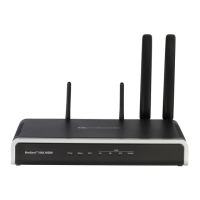User's Manual 47. Automatic Provisioning
Version 6.8 647 Mediant 500L MSBR
47 Automatic Provisioning
This chapter describes the device's automatic provisioning mechanisms.
47.1 Automatic Configuration Methods
The table below summarizes the automatic provisioning methods supported by the device:
Table 47-1: Automatic Provisioning Methods
BootP / TFTP DHCP Automatic Update Methods SNMP
(EMS)
67 66 HTTP/S TFTP FTP NFS
No No No Yes Yes Yes No Only VoIP
Configuration
47.1.1 DHCP-based Provisioning
A third-party DHCP server can be configured to automatically provide each device, acting
as a DHCP client, with a temporary IP address so that individual MAC addresses are not
required. The DHCP server can provide additional networking parameters such as subnet
mask, default gateway, primary and secondary DNS server, and two SIP server addresses.
These network parameters have a time limit, after which the device must 'renew' its lease
from the DHCP server.
The device can use a host name in the DHCP request. The host name is set to acl_nnnnn,
where nnnnn denotes the device's serial number. The serial number is the last six digits of
the MAC address converted to decimal representation. In networks that support this feature
and if the DHCP server registers this host name to a DNS server, you can access the
device (through a Web browser) using the URL, http://acl_<serial number> (instead of
using the device's IP address). For example, if the device's MAC address is 00908f010280,
the DNS name is acl_66176.
Notes:
• When using DHCP to acquire an IP address, the Interface table, VLANs and other
advanced configuration options are disabled.
• For additional DHCP parameters, see ''DHCP Parameters'' on page 801.
To enable the device as a DHCP client:
1. Open the Application Settings page (Configuration tab > System menu >
Application Settings).
Figure 47-1: Enabling DHCP - Application Settings Page
2. From the 'Enable DHCP" drop-down list, select Enable.
3. Click Submit.
4. To activate the DHCP process, reset the device.
The following shows an example of a configuration file for a Linux DHCP server
(dhcpd.conf). The devices are allocated temporary IP addresses in the range 10.31.4.53 to

